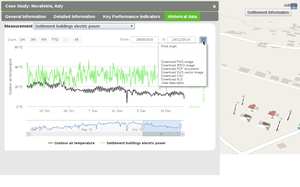Horizon ZERO PLUS

In this project, a comprehensive, cost-effective modular system for Net Zero Energy (NZE) settlements will be developed and implemented in a series of case studies across the EU.
The goal of this project is to provide the market with an innovative, yet readily implementable system for NZE residential neighbourhoods that will significantly reduce their costs. Consequently, the project has the following five main objectives:
- The first objective of the project is a reduction of the operational energy usage in residential buildings to an average of 0-20 kWh/m2 per year, compared with the current average of 70-230 kWh/m2 energy per year. The reduced energy consumption will be attained through the application of a number of technologies, including highly efficient insulation, heating and lighting, as well as automated Building Energy Management Systems (BEMS) in four selected case studies of 5300 m2 of buildings.
- In order to achieve the NZE goal, at least 50 kWh/m2 renewable energy per year will be generated, on average, in the NZE settlement. This objective will be attained through the integration in the settlement of innovative energy production technologies such as Linear Fresnel Reflectors, advanced building integrated photovoltaics (biPV) and advanced wind driven energy production systems.
- Greater energy efficiency can only be achieved through a transition from single NZE buildings to NZE settlements, in which the energy loads and resources are optimally managed. This objective will be attained through the application of solutions for the distribution network, energy storage and micro grid control on a district level, as well as through an optimum climatic management of the open spaces in the settlement.
- The cost of NZE settlements will be reduced by at least 16%, compared with current costs. This cost reduction will be achieved through a strategy of mass customization. To achieve this objective, a modular building system will be developed that is customized and optimized according to the specific requirements of each building and settlement, yet is implemented through cost-effective industrialized processes
- To ensure that the results of this project will have an impact on the building industry, the final objective is a market uptake of the solutions developed in this project by the year 2018. This will be attained through the demonstration of the solutions in four different real-life case studies across the EU under different climatic conditions, and through the dissemination and exploitation of the results of these case studies, based on a comprehensive market analysis and business plan.
- To support the shift towards a resource-efficient, low-carbon and climate-resilient buildings and districts by enhancing the role of the Europe’s construction industry in the reduction of the EU’ carbon footprint by almost 77kgrCO2/m2 with total 408 tonnes CO2 offset for all ZERO-PLUS case studies. More information can be found here


